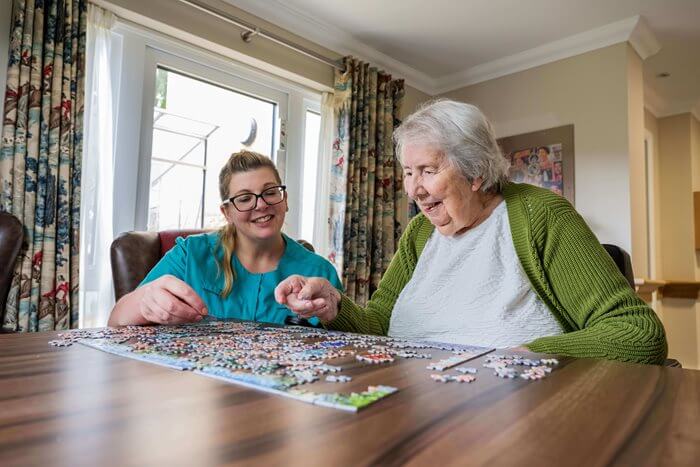When a loved one receives a dementia diagnosis, family members and friends might feel that they are faced with more questions than answers. It can be a confusing and worrying time.
That’s why we’re here to help you understand how to deal with dementia by recognising the key signs and common behaviours.
What causes dementia?
Dementia is caused by a condition that damages nerve cells in the brain, which affects how the brain works. There are several different diseases that cause the symptoms we call dementia, such as Alzheimer’s disease and vascular dementia.
Different symptoms are caused by damage to the brain occurring in different areas.
What are the signs of dementia?
The symptoms of dementia can be different for every person living with the condition, but the most common early sign is memory loss.
Other frequently recognised signs include difficulty concentrating or planning, struggling to communicate, confusion about time or place and changes in mood. Because dementia appears differently in different people, it is important that friends, family and carers take a personal approach to dementia care.
Understanding dementia behaviours
One of the biggest challenges of coping with a dementia diagnosis is making sense of the changes in behaviour that arise in your loved one. From out-of-character swearing to hiding possessions, it can be difficult to understand what’s going through a loved one’s mind.
Common behavioural changes include:
- Repeating questions
- 'Walking with purpose', also referred to as wandering or pacing
- Sleeping at unusual times due to disruption to the sleep cycle
- Feelings of distress causing agitation
- Removing clothing
- Delusions or hallucinations
Behavioural changes occur because of the damage dementia does to the brain. For instance, your typically sweet, calm mum may suddenly become angry and begin swearing if dementia has affected areas of the brain that deal with verbal communication, while your dad might be hiding his food because he can’t remember what to do with it.
Changes in behaviour also occur when a person’s needs are not being met – if for instance they are in pain, hungry or feel anxious and don’t know how to express these feelings.

The loss of recent memories also causes changes in behaviour. With older memories becoming stronger, your loved one might call you by the name of another family member – maybe even one who has passed away.
They may also fall back into routines from their past, like believing they need to collect the children from school, and this can cause them to become distressed. These behaviours are referred to as sundowning syndrome, as they often occur in the evenings.
While many changes occur in a loved one’s behaviour, you might be surprised to discover that dementia can also cause physical changes. The condition's impact on the brain can affect a person’s ability to walk and can weaken their vision.
What are the stages of dementia?
Dementia is a progressive condition, meaning the symptoms will change and worsen over time. The rate at which this happens depends on both the individual and the type of dementia they have, and it can occur over months or years. It may be difficult to accept the changes in your loved one; nearly half of relatives in our survey said they had been unprepared for the speed at which their loved one changed.
By learning more about the specific type of dementia your loved one has, you can ensure you are armed with the knowledge of what the future may hold.
Our care homes often run events and dementia cafés to help people dealing with dementia at any stage in their journey find information, support, and community. Discover more about dementia support for families and carers.
How to help someone with dementia remember
If a loved one has been diagnosed with dementia, it’s important to help them maintain their wellbeing and keep their brain active. For instance, supporting them with a hobby they have always loved can slow the progression of dementia.
In our Long Lost Hobbies campaign, we explored how revisiting activities from the past can help those living with dementia to remain engaged and active. Hobbies bring both physical and mental benefits, from helping people with dementia forge new relationships to decreasing stress and resurfacing memories.
Hobbies bring both physical and mental benefits, from helping people with dementia forge new relationships to decreasing stress and resurfacing memories.
Taking part in these and other reminiscence activities can offer those living with dementia a chance to discuss memories from their past, helping them to explore familiar emotions and hold conversations.
If you find that communication with a loved one is particularly difficult, try an approach that
our carers are trained to use called ‘being in the moment’. This involves going with the flow of your loved one’s conversation and meeting them where they are – whether that is today, a decade ago, or their childhood.
Instead of trying to correct your loved one or remind them of who you are, listen to them and ask simple questions to understand where they are in that moment. Our Long Lost Hobbies campaign offers more ideas for reminiscence activities. While these don’t always bring back memories, they can ease your loved one’s stress and give you a new opportunity to connect.
Learn more tips for dealing with dementia in our free guide, ‘Let’s talk about dementia’.
Dementia care at Care UK
We're proud to collaborate with academic partners and respected dementia experts on our approach to dementia care. Our teams are passionate about providing care that helps people living with dementia to live as independently as possible.
We're here to help you throughout your dementia journey. Why not get in touch with your local care home to see how they can help?





